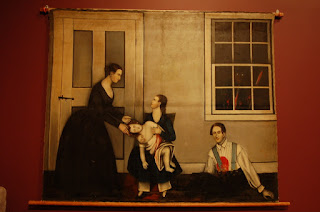POLE IN WRONG HOLE
“One afternoon the contractor put me to work aside a black boy that was all the time full of devilment, and told him to learn me how to make chair bottoms. Every little chance that this nig could get, he would come over to my bench and pretend he was showing me something about my work, when at the same time he would be a talking about something else, which would make me burst out and laugh. One day this nig had said something to me, which made me laugh very much and caused the tears to rush to my eyes. The Keeper happened to see this piece of fun going on and he called us both down, and wanted to know what it was that tickled us so? The nig confessed what it was and the Keeper ordered him to pull off his shirt, and he gave him a dozen on his bare back.”- Austin Reed, The Life and Adventures of a Haunted Convict copyright 2016
With Jack gone, it falls to Reed, Freeman and one last appearance by Henry Seward, to wrap things up. There were ten shops at Auburn providing convict labor and cheap goods to a variety of contractors throughout the region. The workshops were: cooper, tool, weaving, hame (horse collars), cabinet, spinning, machine, comb, shoe, and tailor. The Newgate experiment in prison-made goods had met with opposition from local urban industry, unable to compete in the New York metropolitan area with cheap prison labor. In the hinterlands of Western New York, with little industry to speak of, there was no such opposition or stigma attached to the label “Prison Made. Business was booming along the canal.
By now the second Industrial Revolution was in full swing. “Dewitt’s Ditch,” had been completed in 1825. Radiating stage roads were rough, but plentiful, and there was talk of the new horse-drawn rail carriage, already being replaced with a steam power. The railroad was coming. Samuel Morse’s invention, the telegraph, was radically changing communication with every pole planted and every mile of wire strung. For the first time in history people were able to communicate beyond the line of sight, or the sound of the tolling chapel bell. The first Morse code message was sent in dots and dashes from Baltimore to Washington DC in 1839. It read: “What hath God wrought?”
The flip side of all this progress was that, the now stranded white immigrant and black canal laborers, who had dug the Erie Canal, the out of work dock workers in Albany, and the thousands of poor tenant farmers scattered across the Rensselaer, Livingston and Hardenbergh patents were constantly disenfranchised and threatening revolt. From Albany to Cooperstown and down to Neversink, lease hold farmers (both black and white) laborers and men who sympathized with their struggle began to organize and oppose the manor system, willing to use force. For the first time since the revolution, organized armed conflict was back in full swing in the Catskill hills of New York.
Austin Reed was admitted to Auburn Prison in the Spring of 1840, he was seventeen years old. In September of the same year sixteen year old William Freeman joined him. The black population of Auburn Prison was “less than 10 percent” at the time. The boys were both mixed race, so it’s very likely they met, but who knows if they had been friends or enemies. Reed never mentions Freeman by name in his narrative but does refer to the funny and “whipped” black boy “nig.” Could this be William Freeman?
The racism between blacks, whites and Indians, light skinned blacks against darker skinned, educated as opposed to the under-educated, sane vs. insane, harkens back to the earliest strategies employed by the ruling elite to divide and conquer. Survival followed imitation. House slaves were pitted against farm hands, and as blacks became increasingly urbanized, to be called “country” was a derogatory dig at those who chose a rural existence. All this happens to be an inherently ugly part of human nature. No matter how low or high your station in life, you can always find someone farther down the food chain, “nurture” having no part in it at all. It’s just our nasty human nature.

Comments
Post a Comment